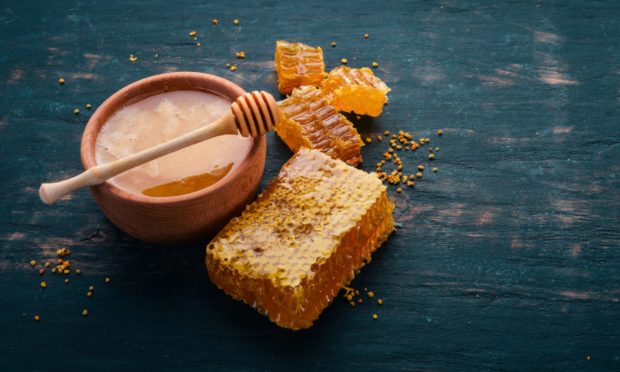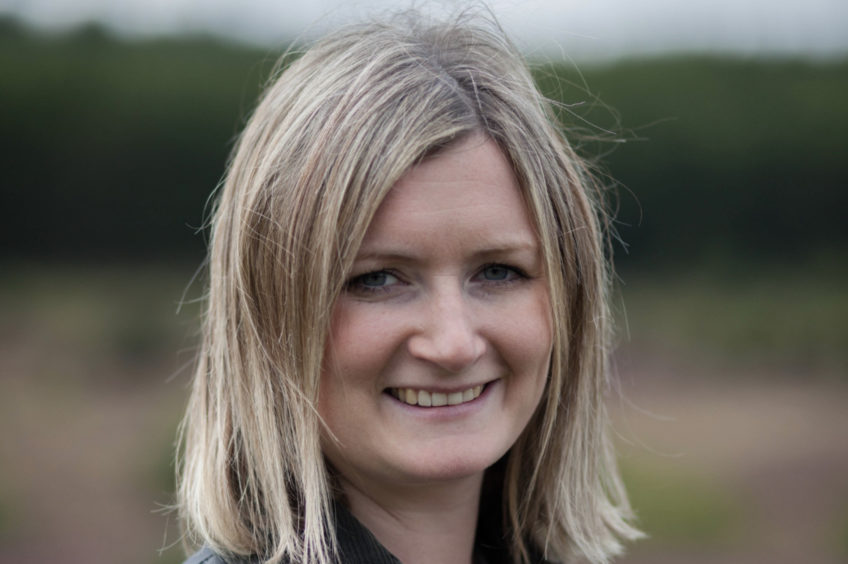Rebecca Shearer lifts the lid on the global problem of fraudulent honey-making and hears how a new initiative aims to give consumers confidence in the products they’re buying.
Honey may not have leapt out to you as a candidate for global crime, but, next to Scotch whisky it is one of the foods most at risk from fraudulent practices.
With products bulked out with water, sweeteners, sugar and other substances, the act of making and selling impure honey is known in the business as ‘honey laundering’.
The international crime organisation Interpol advises: “Illicitly produced honey has been found to contain potentially harmful antibiotics. Always read the ingredients and avoid products that have added sugar or syrup. Buy from local producers where possible.”
But to what extent is the problem of ‘honey laundering’ prevalent in Scotland and how do we know that the product we are consuming really is what it says it is?
Edinburgh-based Scottish Bee Company, one of the nation’s most widely-known honey producers, recently became leaders in the regulation of the product as the first UK food product to be awarded the British Standards Institution (BSI) Kitemark for food assurance.
The new BSI Kitemark has been created to help food sector organisations like the Scottish Bee Company to verify food label claims, deliver consumer trust and support transparency in the food chain. It comes in response to the food industry’s increasing levels of food fraud which it aims to combat by independently verifying food product label claims to rebuild years of eroded consumer confidence.
Suzie Millar, Co-founder of The Scottish Bee Company, said: “We’re absolutely over the moon to be the first food product in the UK to have been awarded the new BSI Kitemark for Food Assurance.
“Provenance, purity, social responsibility and environmental sustainability is so important to us and we wanted to assure our customers around the world that when they buy a jar of our ‘Scottish heather honey’, that’s exactly what they’re getting.”
And when it comes to honey being open to adulteration, Suzie sees it as an important issue for the industry and says bad-quality products can enter the supply chain without consumers even being aware of its origins.
She said: “The rules surrounding honey are very, very strict. Sometimes people are making bad honey but they maybe don’t know that they are. For instance, they might use too much smoke around the bees which then gets into the honey. If the honey smells of smoke then it’s not allowed to be called ‘honey’.
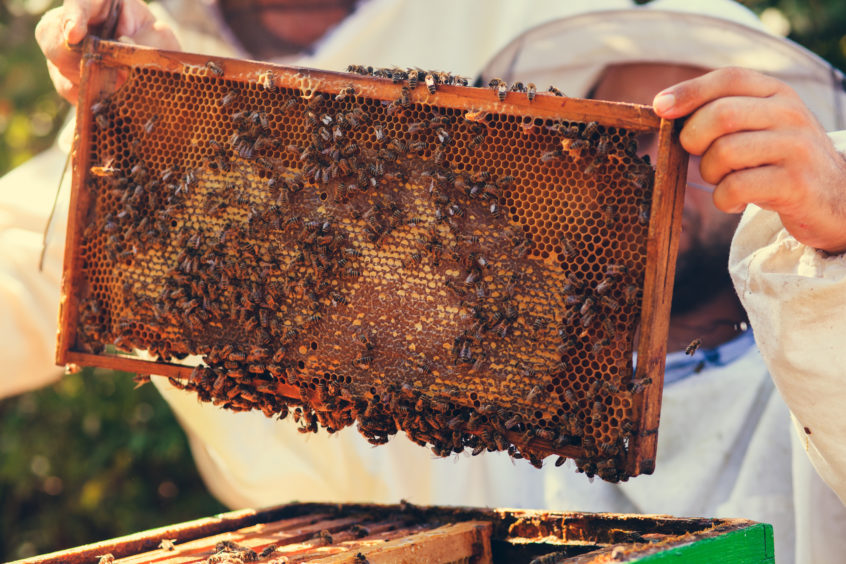
“Also, if you have put two or three types of pollen into the product but you’ve called it just one type of that honey, that’s not allowed. If there is a high water content in the honey, it’s also not allowed to be called honey, yet there are a lot on the market that have a high water content. If there are any nettle or tin smells in it then, again, it’s not allowed to be called honey.
“Really, the rules around honey are so tight. But there are so many ways that people can have fraudulent honey without even knowing it. It’s really easy to make a runny honey by adding sugar syrup.”
Four years ago, the government passed the Honey (Scotland) Regulations Act 2015 which lays out the rules and regulations surrounding the making and defining of legitimate honey products.
It states the difference between genuine honey and when it should be called something else such as baker’s honey, filtered honey, chunk honey and extracted honey, for example.
Suzie said, in relation to the Act: “It’s fine to eat honey if it’s left to ferment or has some smoke in it, in fact a lot of these processes above still make it edible, but it just has to be labelled as ‘baker’s honey’ and sold at a different price. Baker’s honey can also only be sold as an ingredient in something rather than on its own.
“We weren’t aware of a lot of these regulations until we wanted to start selling our honey in certain places so, again, a lot of people making honey might not even be aware that their honey is bad quality.
“This significant new ‘Food Assurance’ status will hopefully raise the profile of our honey in the global market and go a step further to establishing it as a truly pure Scottish product.”
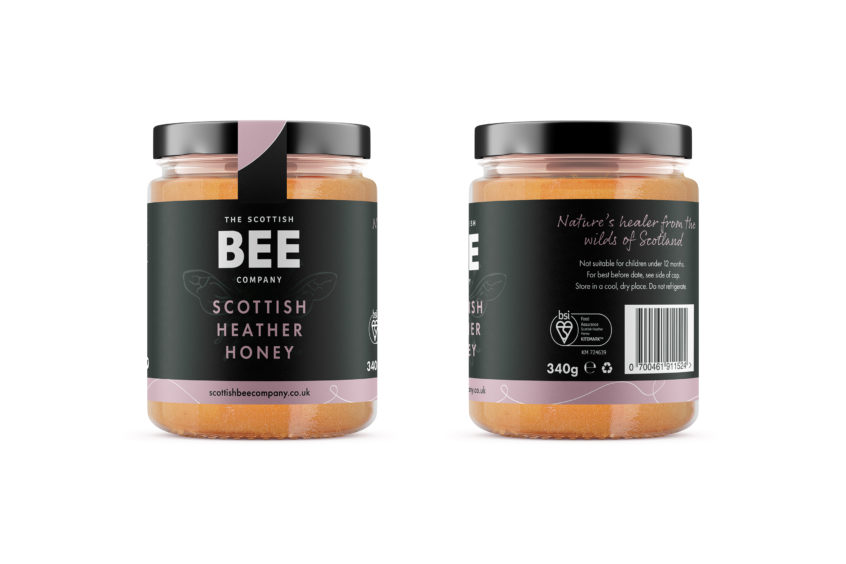
In terms of the global picture, it’s easy to see how the problem of so-called ‘honey laundering’ may occur.
Richard Werran, EMEA Director for Food at BSI (British Standards Institution), who leads the team responsible for awarding food products with BSI Kitemarks, said much of the adulterated honey comes to Scotland from outside Europe.
“After whisky, which is perhaps the biggest issue in the industry (30% of all whiskies from Scotland in China are counterfeit), honey was a big problem. People are prepared to pay very high prices for the real thing but sometimes they’re not getting that.
“There’s in excess of half a million tonnes of honey produced in China a year, for example, and production in honey has increased by 88% since 2000. Yet the number of hives has only increased by 21%. Their hives have been affected, like everyone else, by falling bee populations and pesticides affecting bee health. So there are definitely indications that something is wrong.
“There are big drivers in honey as it’s a high-value product and it’s in high demand, particularly in the Middle East, the UK and the US. So there’s a great incentive for adulteration to take place.
“We call it ‘honey-laundering’, which is where sugar syrups that may contain fructose, or rice, or corn syrups, have been purposely blended into a genuine honey product in Asia, shipped to central Europe where they are given a new identity and then enter the food chain that way.”
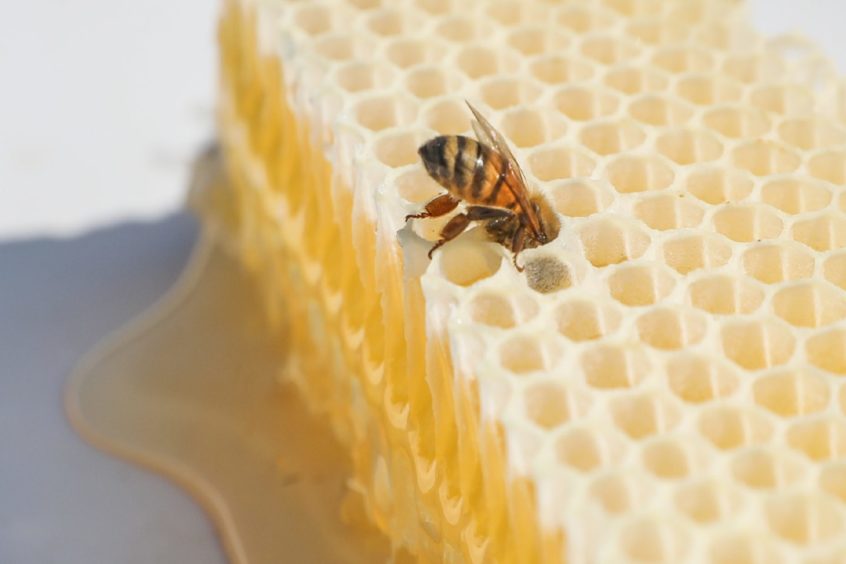
Suzie added: “There was a global honey competition that happens in Canada every year and at the last one, in September 2019, around 45% of the entries were removed straight away because they weren’t actually honey.”
In terms of achieving the BSI Kitemark, a lot of testing went into Scottish Bee Company’s product, which Suzie believes can’t be replicated throughout the industry.
She said: “We sample test all of our honey before we put it out into the market, but I’m not aware of that being a common practice. We’ve tried to have a strong brand message and do sample analysis. A lot of the people producing honey, who we don’t want to stop, are the small-scale bee farmers. But they can’t afford to send off for a £250 test each time to see if their honey is actually honey.
“So it would be very difficult to create a high-level regulation that everyone has to adhere to because of all the smaller producers who wouldn’t be able to afford that.
“Also, nobody can produce any ‘organic’ honey within the UK and that can only be produced in other countries. That’s largely because there’s not enough space here for bees to fly around – because bees fly within a nine-mile radius, we cannot guarantee that somebody somewhere hasn’t used pesticides in their garden within that nine-mile radius.
“In places such as Mexico, they have miles upon miles of land that is just designated for honey-producing bees and they have control over what is used on those lands.”
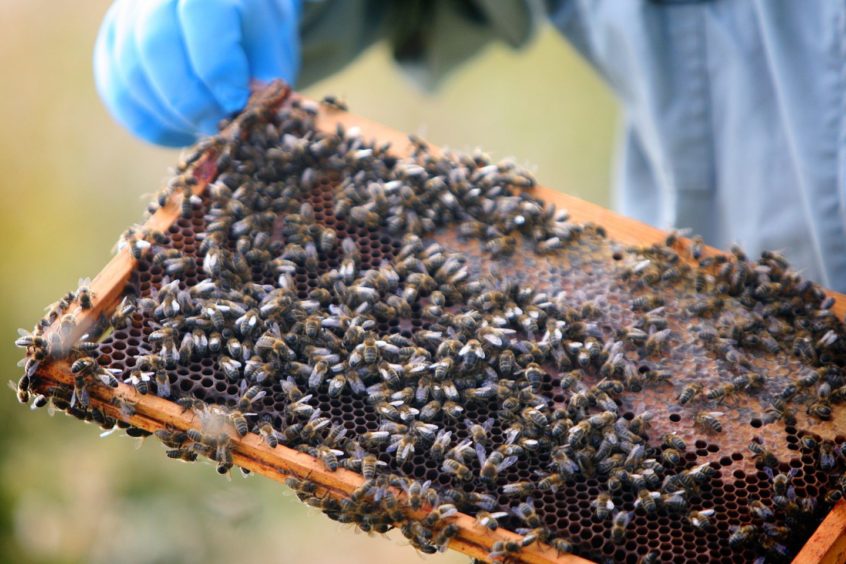
Richard also added that the food industry is over-regulated. He said: “Where my BSI counterparts in medical, aerospace and automotive have one other regulator in their industry, in food we have more than 440 standards, which is completely unsustainable.
“We spent four years crafting this where other programmes fall short on what they’ve set out to achieve. I wouldn’t have said this the day after we launched but now I can say that, within a couple of years, if a honey product hasn’t got a BSI kitemark on it, it’ll be pretty much impossible to sell here.”
In terms of the impact of coronavirus affecting the adulteration of honey, Richard believes it may have made the problem worse.
“Covid-19 came along and that changed consumer behaviour and food manufacturers realised that global food supply chains are highly vulnerable. Consumer demand also went through the roof, demand for honey went through the roof, particularly with manuka honey, though all honeys were affected.
“There is some circumstantial evidence that certain honey is effective against certain microbes and viruses and has been used since Egyptian times for such purposes. So there was an increased incentive for more honey adulteration to take place.
“There’s no programme offering customer promise in the same way that the Kitemark can do.”
Howard Kerr, Chief Executive at BSI, said: “Today, people want to understand the important details about the food they eat.
“By extending the power of the Kitemark into areas like food authenticity and provenance, including the Scottish Bee Company, BSI can serve that need. After all, customers deserve food that’s safe, sustainable and socially responsible.”
